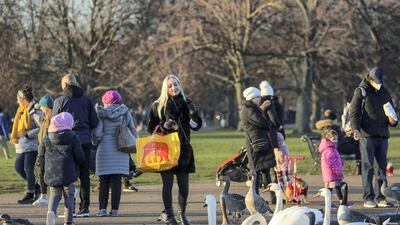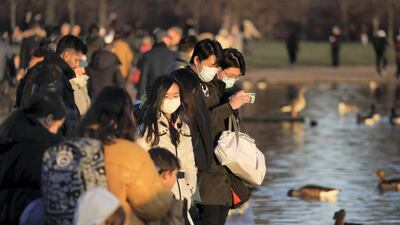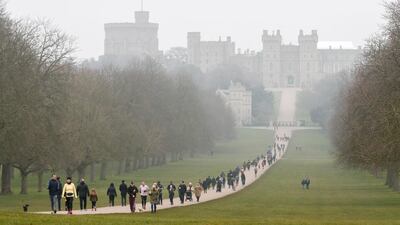Britain is considering bringing in tougher lockdown rules as its chief medical officer warns the pandemic is entering its worst phase.
Deaths have now exceeded 81,000 in the UK, and a variant of the disease is ripping through the population, with as many as one in 20 people in parts of London now infected.
Prof Chris Whitty, the government's chief medical adviser, repeatedly pleaded with Britons to stay at home unless it was essential to go out.
"We're now at the worst point of this epidemic for the UK," he told the BBC's Radio 4 Today programme.
“The numbers at the moment are higher than they were in the first peak by some distance. We’re now in a situation in the UK as a whole where one in 50 are infected, in London it’s around one in 30, and in parts of London it’s around one in 20. There’s a very high chance if you meet someone unnecessarily they will have Covid.”
He said more than 30,000 people in the NHS were infected with Covid-19 as of Sunday compared with about 18,000 at the peak of the first wave in April 2020.
He said that "anybody who is not shocked" by the number of people in hospital "has not understood this at all".
"This is an appalling situation," he said.
Prime Minister Boris Johnson warned lockdown rules may get stricter to help drive down the infection rate.
Proposals to strengthen lockdown restrictions include banning people from two separate households meeting for exercise after speculation that people are exploiting the exemption to socialise with friends.
Stricter rules for supermarkets, such as one-way systems and mask-wearing in outdoor queues, will be a particular focus, while mask-wearing could also be enforced in offices and crowded spaces outside.
Vaccine Minister Nadhim Zahawi said the boundaries of lockdown were being “pushed against” by some.
“We’re reviewing all the restrictions,” he said. “I am worried about supermarkets, people actually wearing masks, following the one-way system and making sure when it’s at capacity they wait outside the supermarket. I’m worried about some of the pictures I’ve seen of social interaction in parks.”
Prof Peter Horby, chairman of Nervtag, the New and Emerging Respiratory Virus Threats Advisory Group, warned that the UK was in the “eye of the storm” and said it “remained to be seen” whether the current restrictions would meet objectives.
“If there’s any sign that they’re not, then we’re going to have to be even stricter,” he said.
The UK reported 54,940 new Covid-19 cases and 563 deaths on Sunday.
The total death toll recorded by the country since the start of the pandemic exceeded 80,000 at the weekend.
The grim milestone comes as seven mass vaccination centres open across England.
The government wants to vaccinate 14 million people – the over-70s, healthcare workers and clinically vulnerable – by mid-February.
Health Secretary Matt Hancock said on Sunday about two million people in the UK had been vaccinated, with 200,000 jabs being administered in England daily.
He said the proposals for vaccine distribution would be the "keystone of our exit out of the pandemic".
But Prof Stephen Powis, NHS England medical director, said distribution will not affect the number of deaths "for a few months yet, the NHS is under intense pressure and that's potentially going to get worse".
"We’re going as fast as we possibly can. As soon as we get the vaccine from manufacturers, we’ll be getting it into people’s arms," he said.
Meanwhile, a leading French epidemiologist called for authorities to close the border with the UK.
France expanded a night-time curfew in Marseille on Sunday after authorities discovered the new UK strain of coronavirus in the city.
The curfew that runs from 8pm to 6am will start two hours earlier in Marseille, which joins other French cities such as Strasbourg and Nice in the stricter measures.
"It is important that we consider whether we need to close the borders to a limited number of countries, notably the UK and Ireland," Arnaud Fontanet, a member of France's scientific council that advises the government, told BFM television.
"This is certainly a point for the agenda. It is not up to the scientific council to decide this, but we want to raise the issue."










